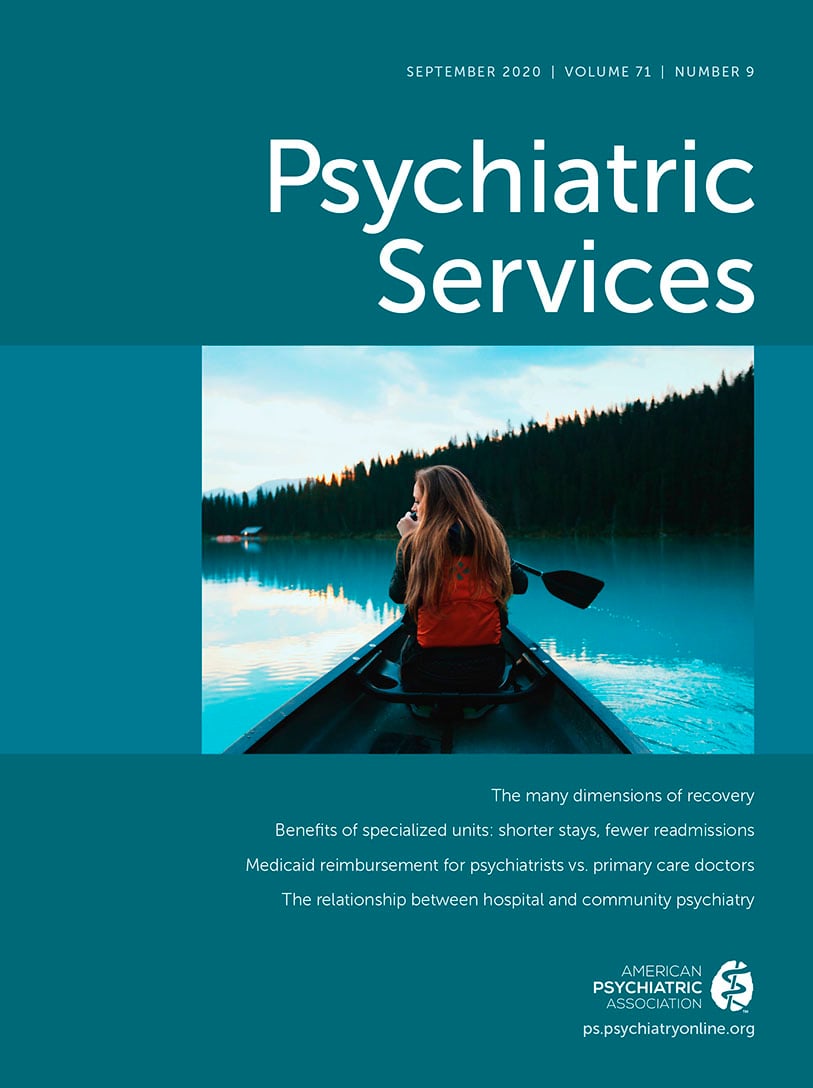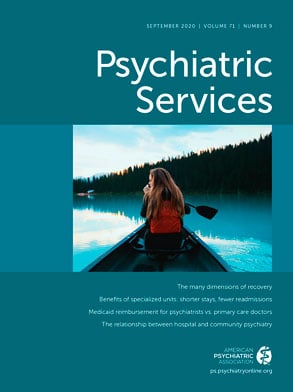Illness Management and Recovery (IMR) is an evidence-based psychosocial intervention developed in the United States to support recovery among people with serious mental illness (
1). It is a manual-based intervention focused on identifying and making progress toward personally meaningful goals and wellness management.
The intervention was developed on the basis of five self-management strategies that were found to be effective in a review of 40 empirical studies (
1): psychoeducation, behavioral tailoring for more effective use of medication, relapse prevention, social skills training, and coping strategies. IMR has been implemented successfully in many high-income countries and has been found effective in improving knowledge, making progress toward personal goals, improving daily functioning, helping to cope with stress and symptoms, and improving hope and quality of life (
2).
There is growing awareness of the need for cultural adaptation of evidence-based practices to increase access and equality of care and to improve the effectiveness of mental health services, because culture influences perception of illness, willingness to seek help, and illness management (
3,
4). Cultural adaptations involve systematic revisions in language, culture, and context designed to adjust the intervention to the needs of a specific group, making it more likely to improve outcomes. The process often involves emphasis on the role of religion and spirituality, as well as on the family and broader community (
3).
Two meta-analyses of cultural adaptation and competency based on 99 studies found a medium-strong effect (Cohen’s d=0.50), suggesting that clients receiving culturally adapted treatments have usually experienced better results than those in control groups. The analyses calculated effect sizes on the basis of multiple comparisons, which varied by study (
3).
In 2011, the Israeli Ministry of Health published a circular titled “Cultural Competency in Mental Health in Israel,” which emphasized the need to reduce gaps and inequalities in service delivery and the importance of cultural adaptation in achieving these goals. Considering this initiative and our positive experience with IMR, it was assumed that the intervention could have a positive effect on Israeli Arabs with serious mental illness if cultural adaptations were made. The process was informed by three theories: ecology of human development, a heuristic framework for the cultural adaptation of interventions, and the ecological validity model. It included four stages: information gathering from the literature and a focus group providing information about cultural adaption processes and advice for the successful implementation of evidence-based intervention among Arabs, selection of the cultural adaptations and their implementations by the focus group and IMR experts, translation into Arabic, and training Arab practitioners in implementing the adapted intervention.
One example of a cultural adaptation is psychoeducation, which in this case had to take religious beliefs into consideration. As can be seen in the sociodemographic data, most treatment group members defined themselves as “religious” or “traditional.” Accordingly, psychoeducation provided about the causes of mental illness emphasized that it was not a result of loss of faith and that managing symptoms should not rely exclusively on strengthening faith. This process was facilitated by showing films of religious sermons and referring to relevant Quran verses. The practitioners encouraged discussions around this issue while showing sensitivity and respect for the participants’ faith. This approach was consistent with the literature on the contribution of religion and spirituality to effective coping (
5).
Another example of a cultural adaption is related to the role of the family. Most participants in our sample lived with their families, and the culturally adapted version of IMR included a newly developed component encouraging participants to invite their families to take part in the intervention. Family members were invited to attend either group or individual sessions without the participant. The adaptations also involved developing a brief IMR manual for family members, based on the clients’ manual. Note that the original IMR manual specifically espouses the importance of involving families of participants in IMR, although in practice most programs fall short of any real involvement.
This study examined the impact of the culturally adapted Arabic version of IMR on the ability of Israeli Arabs with serious mental illness to identify and make progress toward personally meaningful goals, better manage their symptoms, and increase their hope, self-efficacy, and quality of life.
Methods
Twenty-two Arab psychiatric rehabilitation practitioners completed 3 days of training in the adapted IMR version and received supervision every two weeks throughout the 9-month implementation. Next, 13 adapted IMR groups began, initially attended by 102 participants.
The study comprised 150 participants: the treatment group included 86 participants who completed IMR (84% of the initial 102), and the matched control group included 64 participants. The inclusion criteria were Israeli Arabs with serious mental illness and a psychiatric disability rating of at least 40%, as determined by a medical committee of the National Insurance Institute. Excluded from both groups were people with severe cognitive impairments and acute psychotic conditions. Data were collected in 2017–2018. Approval was obtained from the institutional review board at the University of Haifa. After receiving a detailed explanation of the study, all research participants provided their written informed consent.
IMR was offered in groups of two to eight participants each for an average of 26 weekly sessions lasting 60–90 minutes each. Eighty-six (84%) people attended more than two sessions and completed the baseline assessment; 77 (75%) attended more than 20 sessions and completed the follow-up assessment. Participants in the control group received standard treatment (e.g., employment, residential, and social services and periodic psychiatric consultation) from the psychiatric rehabilitation agencies in the same settings where the adapted IMR was offered. They completed the same assessments at equivalent intervals.
Participants' ages ranged from 19 to 70 years (mean±SD=40.91±10.82). Most were Muslims (N=135, 90%) and the rest Christians (N=10, 7%) or Druze (N=5, 3%). About 80% of the treatment group members (N=69) defined themselves as “religious” or “traditional” (i.e., moderately religious). Most lived with their families (N=70, 81%), and some lived alone (N=8, 9%) or in supported housing (N=8, 9%). There were no significant sociodemographic differences between the treatment and control groups. All questionnaires were translated from English into Arabic using forward followed by back translation (
6).
Illness self-management and recovery were assessed with the IMR Scale (
7). The clinician's ratings were completed by the director of the rehabilitation agency. Internal consistencies found in the current study ranged between Cronbach’s α=0.77 and α=0.83. Hope was assessed with the self-report Hope Scale (
8), and internal consistency levels were determined for agency (preintervention, α=0.84; postintervention, α=0.83), pathways (preintervention, α=0.80; postintervention, α=0.81), and total score (preintervention, α=0.89; postintervention, α=0.89). Self-efficacy was assessed with the Generalized Perceived Self-Efficacy Scale (
9). Internal consistencies were: preintervention, α=0.93; postintervention, α=0.92. Finally, quality of life was assessed with the Manchester Short Assessment of Quality of Life (
10). Internal consistencies were as follows: preintervention, α=0.90; postintervention, α=0.87. An item on sex life was removed for cultural reasons. All instruments had adequate reliability and validity.
The data were analyzed with SPSS, version 25.0. We conducted t tests to examine whether the groups differed in baseline scores. To examine outcome improvement, mixed repeated-measures analyses of variance (ANOVAs) were used with time (pre-post) and group (treatment and control) as factors. To assess clinically significant change, we used the Reliable Change Index (RCI) (
11).
Results
There were no significant group differences in any of the baseline assessments, apart from the fact that the treatment group participants had a lower mean IMR score (2.89±0.66) than did the control group (3.22±0.69, t=2.97, df=147, p=0.003, Cohen's d=0.49). No significant differences were found between participants who completed the IMR and those who dropped out, either in background characteristics or in preintervention scores.
Repeated-measures ANOVAs were conducted for each outcome measure. As seen in
Table 1, all interaction effects were significant (p<.001), indicating that participants in the treatment group improved significantly between baseline and postintervention, in contrast to participants in the control group.
To determine whether treatment group participants showed reliable changes on the outcome measures compared to the control group, we conducted RCI analyses that revealed significant differences between groups in the rates of clinical improvement among participants on all outcome measures. Most importantly, more than 50% (N=41) of the treatment group showed a reliable increase in IMR in comparison with only 2% of the control group (N=2).
Discussion
To the best of our knowledge, this is the first study to examine the impact of a culturally adapted version of IMR on Israeli Arabs with serious mental illness. The findings indicate significant improvement among those completing IMR in all the domains studied, including recovery, illness management, hope, self-efficacy, and quality of life, with more than half of the treatment group showing clinical improvement.
The positive impact of the culturally adapted version of IMR is consistent with previous studies that found IMR to be effective (
2). This effectiveness is attributed to the fact that IMR is an evidence-based practice that relies on a broad empirical basis (
1) as well as to the cultural adaptation process, during which care was taken to maintain these effective elements while making adaptations.
Findings cited by McGuire et al. (
2) support our results regarding participant and clinician IMR ratings. In several randomized controlled trials and pre-post trials, McGuire et al. obtained better IMR Scale ratings for both participants and clinicians involved in IMR interventions, in comparison with those involved in treatment as usual.
Contrary to the current findings, neither Saylers et al. (
12) nor Dalum et al. (
13) detected any change in hope. This may be because Dalum et al. studied Danish participants, culturally different from those in our study, or because the attendance rate in Saylers et al.’s study was low, whereas the rate was high in our study.
As in our study, Fujita et al. (
14) found that self-efficacy improved among participants in a study of IMR in Japan. The emphasis on the family and its involvement in treatment in both the Arab and Japanese cultures may underlie this similarity in the results of these two studies. Furthermore, as in our study, Fujita et al. (
14) found quality of life to improve, whereas several other studies cited by McGuire et al. (
2) did not detect any change in quality of life. Again, the similarity between the Arab and Japanese cultures may underlie the similarity of our results with those of Fujita et al., but not with those of other studies.
Although our findings support the effectiveness of the culturally adapted Arabic version of IMR, some limitations need to be considered. First, this was not a randomized study, and the comparison group comprised a matched control group. Second, the treatment group was compared with a matched control group that did not receive IMR at all, rather than with a group that received a non-adapted version of IMR. Third, the study included only pre- and postassessments, without a longer follow-up. Fourth, no assessment of fidelity was conducted, so the degree to which the implementation adhered to the model is unknown. Finally, the agency directors were not blinded to whether the consumers in their agency were receiving IMR or treatment as usual.
In summary, this study contributes to the knowledge on the effectiveness of IMR among various cultural groups and members of minority groups who, in addition to managing their mental illness, often experience social discrimination and inequality. It also supports growing efforts to develop and implement culturally adapted evidence-based practices. In light of the positive results, policy makers should be encouraged to invest in cultural adaptions of interventions to increase access to, quality of, and equality of care.
Acknowledgments
The authors thank their partners in the cultural adaptation process from the Ministry of Health of Israel, Ono Academic College, and the Joint Distribution Committee Israel.

